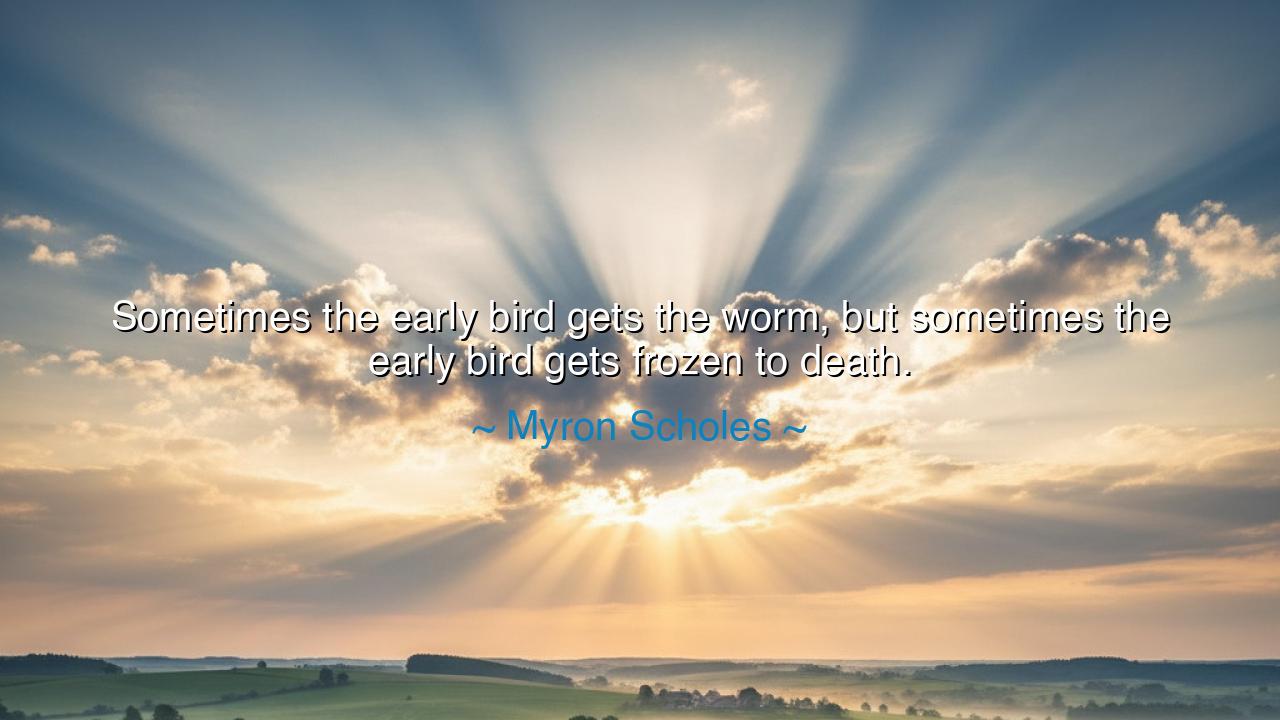
Sometimes the early bird gets the worm, but sometimes the early
Sometimes the early bird gets the worm, but sometimes the early bird gets frozen to death.






"Sometimes the early bird gets the worm, but sometimes the early bird gets frozen to death." Thus spoke Myron Scholes, the great economist and Nobel laureate, whose mind probed the hidden patterns of risk, time, and fortune. Beneath the playful tone of his words lies a truth both ancient and eternal—a reminder that timing, not merely action, governs the fates of those who strive. In this age-old struggle between haste and patience, Scholes teaches that boldness alone is not wisdom; for though early action can bring great reward, it can also bring ruin to those who misread the season. His saying, though born in the halls of modern finance, carries the timeless rhythm of nature itself—the balance between courage and caution, between initiative and prudence.
In the world of markets, Scholes knew that fortune favors neither the reckless nor the idle, but the one who acts at the right moment. The “early bird” of his parable represents the innovator, the pioneer, the one who dares to move first. Such souls are necessary to the progress of humanity—they venture into the unknown, seeking opportunity where others see only risk. Yet, as he warns, not all dawns are warm. The same bird that seeks the first worm may awaken too soon, when the air is cold and the earth still hard. The courage that wins in one season may destroy in another. Thus, Scholes’ wisdom is not a condemnation of boldness, but a call to discernment: to act, yes—but to act with understanding, with respect for the rhythm of the world.
The ancients too understood this delicate art. Sun Tzu, the master of war, wrote that the greatest generals win not by speed alone, but by knowing when to strike. He said, “He who knows when to fight and when not to fight will be victorious.” The rash warrior, like the early bird in Scholes’ warning, may charge into the frost and perish before battle even begins. The wise one watches the sky, feels the wind, and moves when the time is ripe. So too in life, the impulse to be first—to seize opportunity without reflection—can lead to loss, just as surely as hesitation can. The path of mastery lies not in constant motion, but in harmony with timing.
History offers many such lessons. Consider the tale of Robert Falcon Scott, the British explorer who sought to be the first to reach the South Pole. Driven by ambition, he and his men set forth early into the Antarctic cold, underprepared and overconfident. Their rival, Roald Amundsen, moved later, but with foresight, strategy, and respect for the environment. Scott’s expedition, like the early bird in Scholes’ parable, reached the icy dawn too soon—and was consumed by it. Amundsen, who waited and planned, returned alive and victorious. From this, we see that success is not a race to be first, but a journey guided by wisdom, preparation, and timing.
Yet Scholes’ insight extends far beyond the marketplace or the frozen poles—it touches the human spirit itself. In our haste to succeed, to love, to create, we often forget that every endeavor has its own appointed season. The seed planted too early will wither; the word spoken too soon may wound; the dream pursued without readiness may crumble beneath its own weight. Patience is not weakness, but a form of strength—the strength to wait for the right moment, to let time do its quiet work. The early bird who survives is not the one who wakes first, but the one who knows the hour when frost gives way to light.
However, let us not mistake Scholes’ warning for a hymn to hesitation. The wise do not wait forever; they act when the signs align. For though the early bird may freeze, the late bird finds the worm long gone. The lesson is not to delay, but to perceive rightly—to read the seasons of opportunity with the eyes of patience and the heart of courage. Life demands both daring and restraint, both the will to leap and the wisdom to land safely. To master this art is to live not by fear or impulse, but by harmony with the world’s hidden timing.
So, my listener, take these words as both caution and inspiration. Do not rush blindly into every dawn, nor sleep through the day’s arising. Watch the signs—feel the winds of readiness, the warmth of timing. Let your courage be tempered by discernment, and your ambition guided by wisdom. For the world rewards not those who move first, but those who move well. In every venture—whether love, art, or destiny—remember the truth of Scholes’ ancient-sounding wisdom: fortune smiles not on the earliest, but on the most prepared. Act boldly when the hour calls, but never before the frost has melted from the earth.






AAdministratorAdministrator
Welcome, honored guests. Please leave a comment, we will respond soon